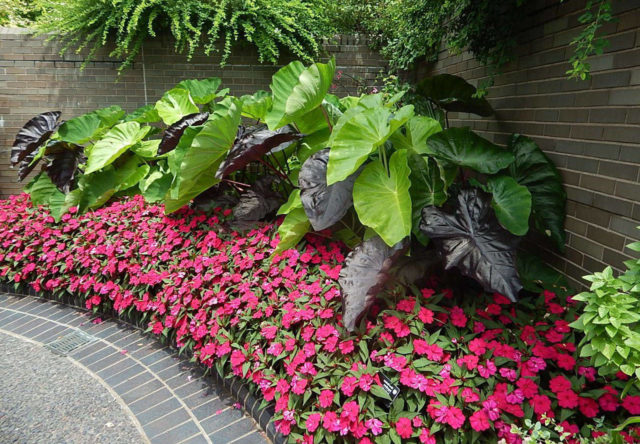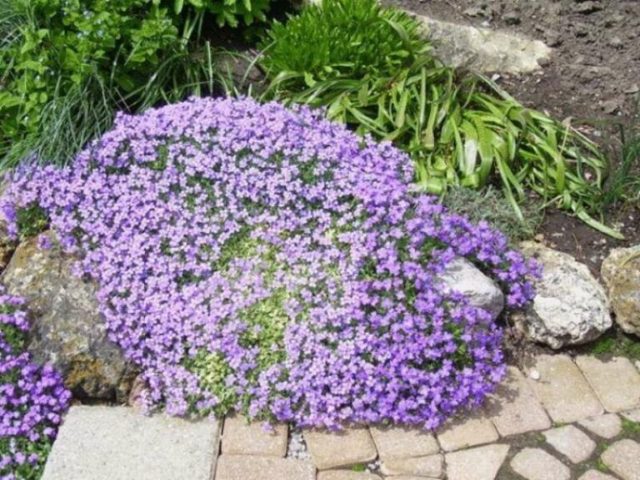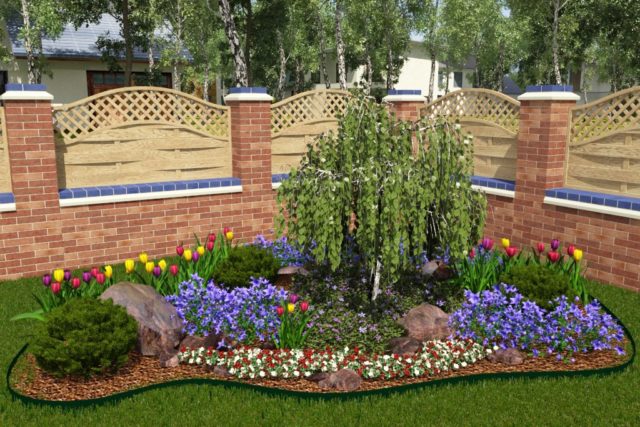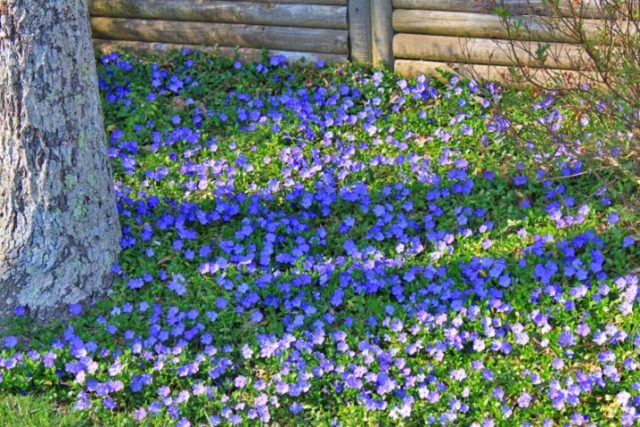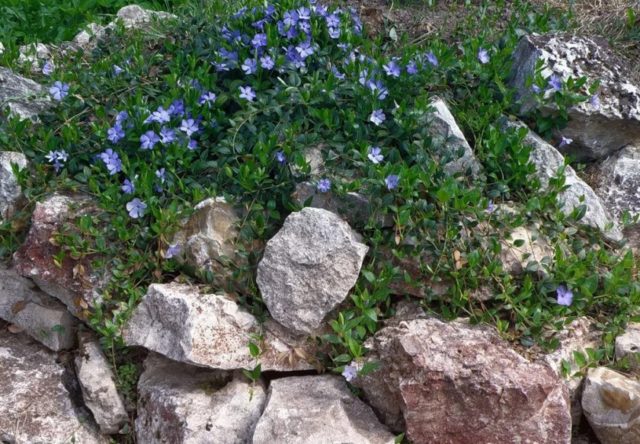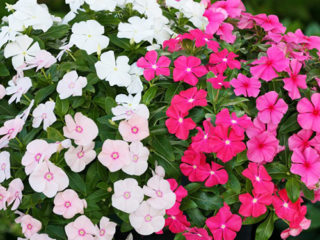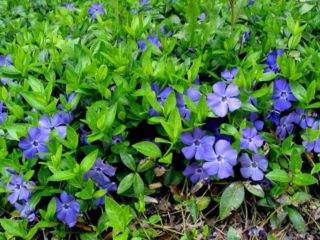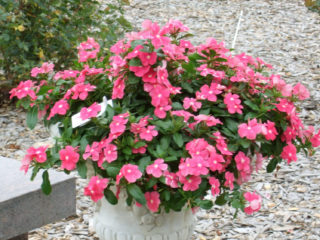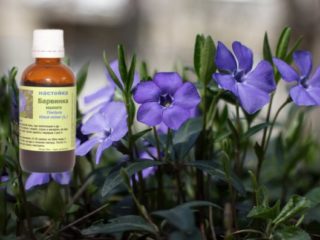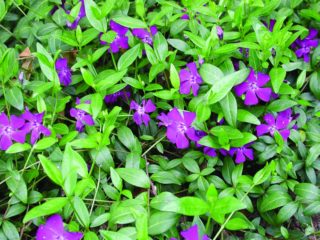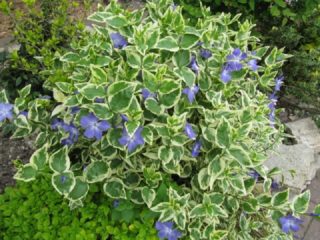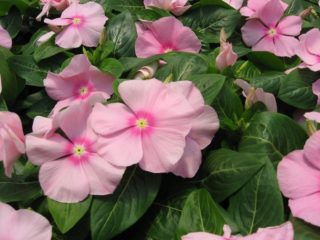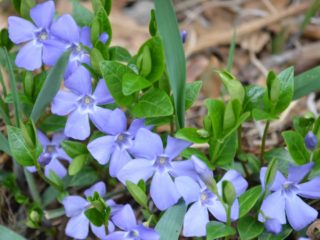Content
Periwinkle is a popular perennial plant that is used for decorative purposes. It is well suited for landscaping parks, flower beds, squares, recreation areas. Gardeners use periwinkle in landscaping primarily as a groundcover, although there are other uses for it.
What does periwinkle look like
Periwinkle (Vinca) refers to creeping evergreens. This is a short perennial shrub from the Kutrovy family. Wildlife is quite common in Eurasia, some species grow in North America. The shrub owes its name to the Latin word "vinca", which means to creep or twine.
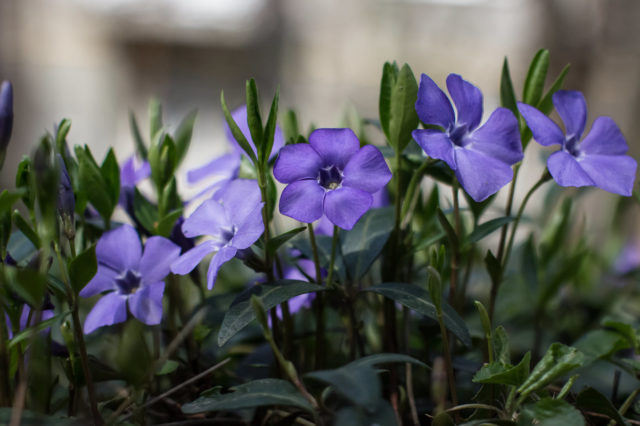
Numerous creeping stems of the plant take root quickly, forming a continuous carpet
Periwinkle is a real find for a lazy grower. This plant has truly unique properties. It is quite decorative, grows without any care, multiplies easily and lives for a very long time. In addition to everything, it has a number of useful properties, is used in folk medicine, and is also used in various magical rites.
In appearance, periwinkle is a small, low shrub growing in a solid carpet. It has tough stems, dark green small leaves. In the spring, the plant has flower stalks, on which buds with petals of a delicate purple color bloom. They can delight the eye throughout the summer and into late autumn.
The most beautiful species and varieties
There are quite a few varieties of periwinkle. Depending on their size, they are divided into several groups, in each of which varieties with different colors are distinguished.
Periwinkle
This periwinkle species has the Latin name Vincaminor. The plant is evergreen, with a weaving stem. Leaves of a rich dark green color with gloss, there are also varieties with a variegated color, with a silvery tint, with a border of various tones from yellow to red. Their shape is oval-elongated with a sharp tip. Peduncles can grow up to 15-20 cm. Flowering is short, occurs in May-June. The color of the petals is from white to purple. The corolla has 5 petals.
Bowles's Variety
This variety is distinguished by soft lilac large flowers. Bowles Variety leaves are rich green, glossy, dense, rather small, with well-read veins. The height of the plant can reach up to 30 cm. Peduncles and part of the shoots are erect, in addition to them, the plant has a large number of creeping stems, due to which a solid green carpet is formed.
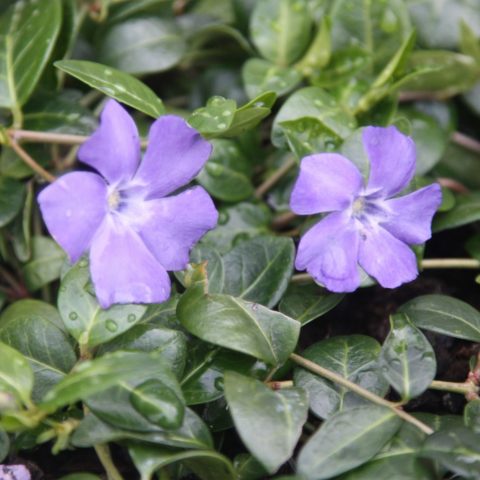
Bowles's Variety buds appear in late spring, sometimes re-flowering can be observed
Darts blue
Darts Blue is a low variety of small periwinkle, it rarely grows above 20 cm. It got its name for the rich blue color of the petals. The leaves are small, glossy, bright green, dense.
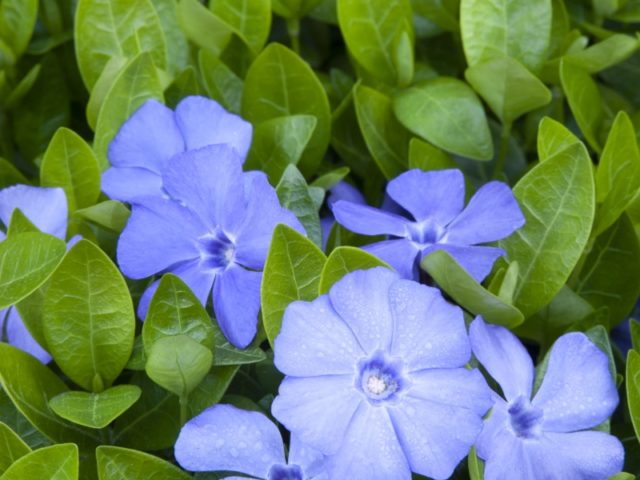
Darts Blue blooms in early spring, less abundantly in summer.
EmilyJoy
Emily Joy has a pure white flower corolla and petals. The leaves are rather large, oblong-ovate, glossy, green with a yellowish tinge.
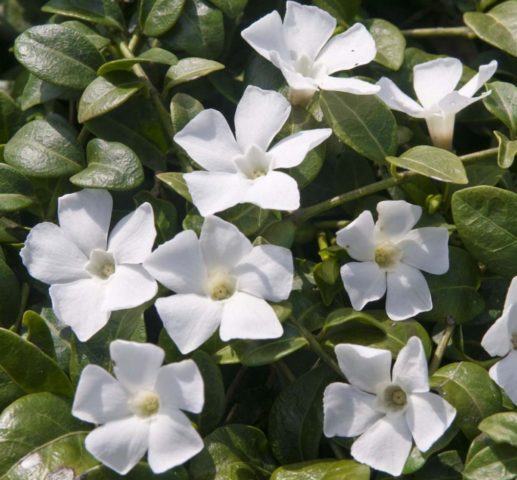
Emily Joy's variety is pretty young
Marie
It is a low-growing variety that is excellent for creating a continuous canopy. Stems are creeping, long, well rooted. Leaves are dense, leathery, bright green. Flowers are small, about 2 cm in diameter, violet-blue, appear at the end of May
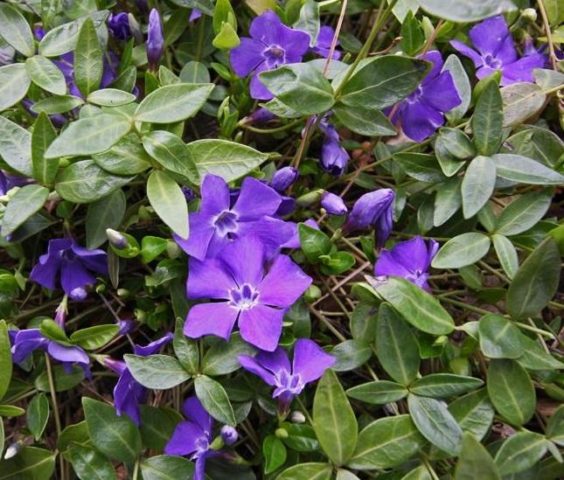
Often in September, there can be a second wave of Mari flowering.
Atropurpurea
This variety is distinguished by the original flower shape, reminiscent of a propeller. The color of the petals of Atropurpurea is purple. The stem is flexible, creeping. The leaves are rather small, green, with a glossy sheen.
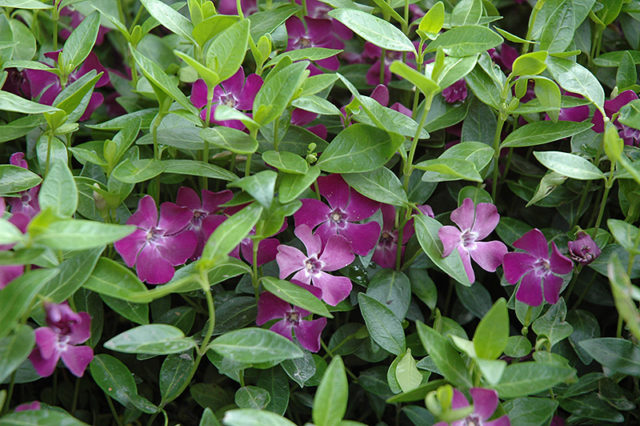
Atropurpurea blooms in May-June
Periwinkle large
In Latin, this variety is called Vincamajor. These are mainly creeping plants of low height with a creeping stem and large leaves and flowers reaching 5 cm in diameter. In ornamental gardening, large periwinkle is used much less often, since the number of flowers on its bushes is much less than on small one.
Variegata
It is one of the most popular varieties of periwinkle. Variegat leaves are large, green, with a light milky greenish border. Flowers are large, purple, rare.
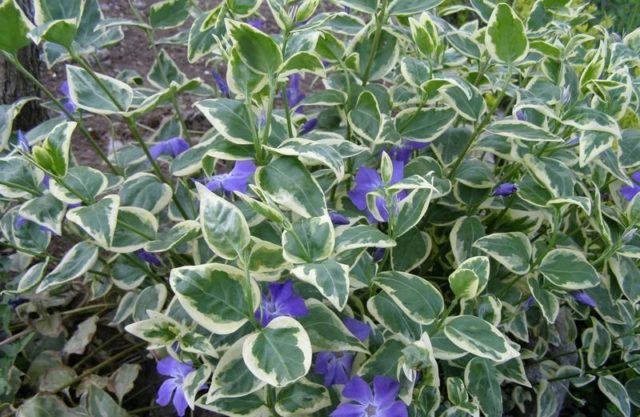
Variegat height can reach 30 cm
Maculata
Periwinkle large Maculata has a characteristic leaf color. Their inner part has an irregular yellowish spot and looks lighter against a bright green background. Flowers are not numerous, large, purple, lighter in the central part of the corolla.
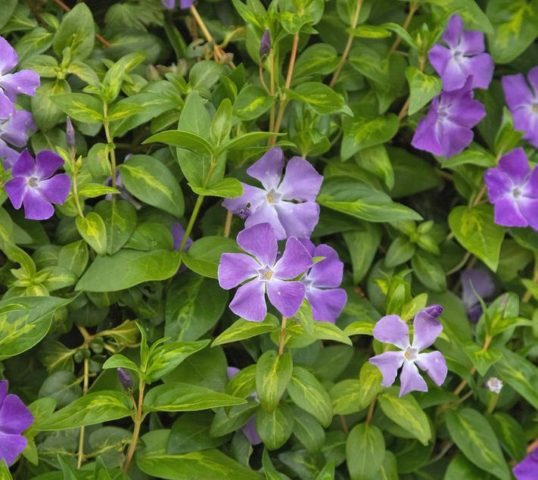
In the Maculata variety, the central part of the leaf is lighter.
Periwinkle pink
Vinca rosea - this is the Latin name for this type of periwinkle. It happened because of the characteristic color of the flower petals. The main difference from other species of this plant is erect stems. Another characteristic feature is the long flowering period, the buds appear on it in the spring and do not disappear until late autumn.
Grape cooler
The variety is distinguished by very decorative lilac-pink flowers with a light center. The plant has dense leathery leaves of a rounded ovoid shape with a light central vein.
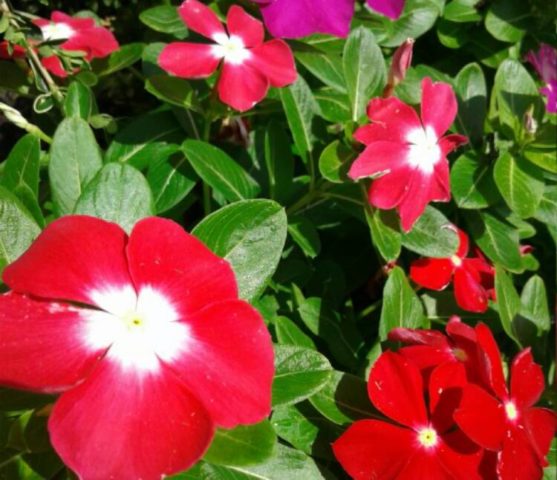
The height of the Grape Cooler bush can reach 60 cm
Peppermint cooler
In this variety, the flowers are pink, while in the center it is more saturated and resembles a slightly spreading bright crimson-red blot. The Peppermint Cooler plant has green large oval-oblong leaves and a strong stem.
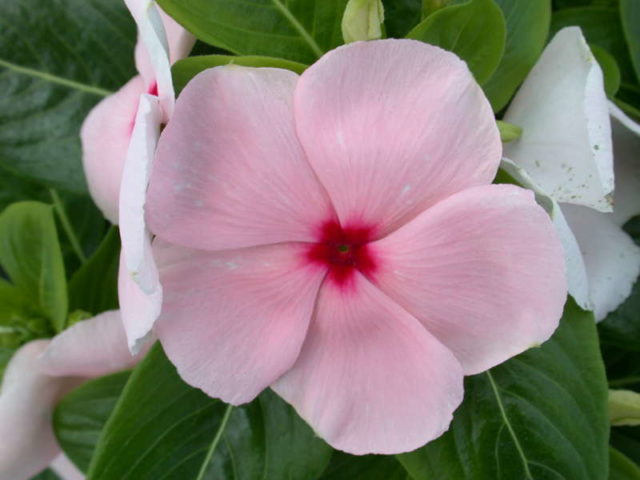
A bright, fuzzy spot in the center of the flower distinguishes the Peppermint Cooler cultivar.
How to arrange a flower bed in the garden
Periwinkle is used mostly as a ground cover plant, forming a continuous carpet. Creeping stems take root easily, so the bush grows very quickly in breadth, becoming denser and covering more and more areas. Here are some of the options for using periwinkle as a decorative element in the garden:
- Border. Periwinkle is great for bordering paths, alleys.
After flowering, the red border will turn green
- Alpine slide. A green carpet with many small flowers looks very impressive among the stones.
The flowering stream "flowing" around the stones looks very impressive
- Mixborder or combined flower beds. Periwinkle goes well with other, larger plants, so it is often used in various floral arrangements or backgrounds.
Periwinkle looks great in mixed plantings
- Substrate. Often these plants are planted under fruit trees instead of the usual grassy lawn.
Blooming carpet is a great alternative to regular lawn
- ABOUTformation of steep slopes. Periwinkle is often used not only for decoration, but also for strengthening and holding the soil on a hill or hill.
The plant perfectly strengthens the slopes
What colors does it match
Periwinkle looks good in individual plantings, but it is not an antagonist and gets along well with many other plants. In mixed compositions, it is planted next to ferns or viols. Often, its neighbors are cereal and bulbous plants: tulips, crocuses, irises, lilies.
Here are some photos in which group plantings you can use periwinkle:
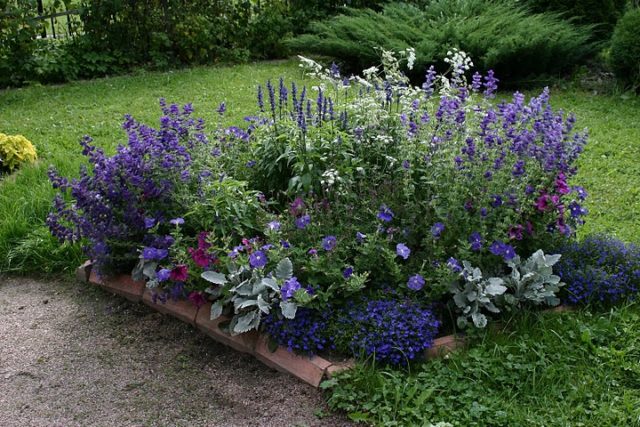
A flower bed in blue tones - the perfect combination for decorating a site
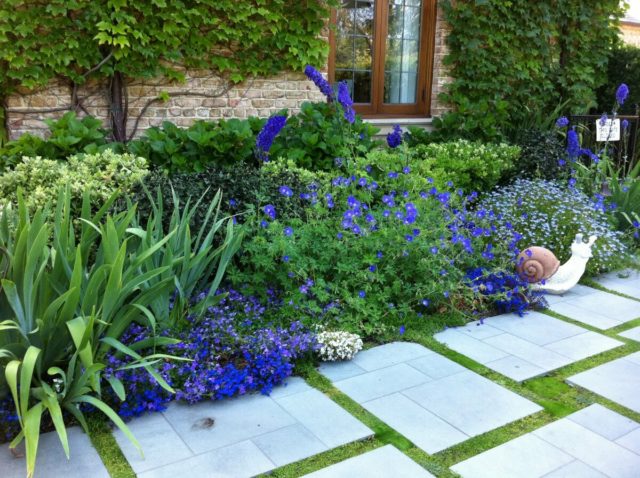
Mixborder in combination with irises and other flowers will decorate the track with dignity
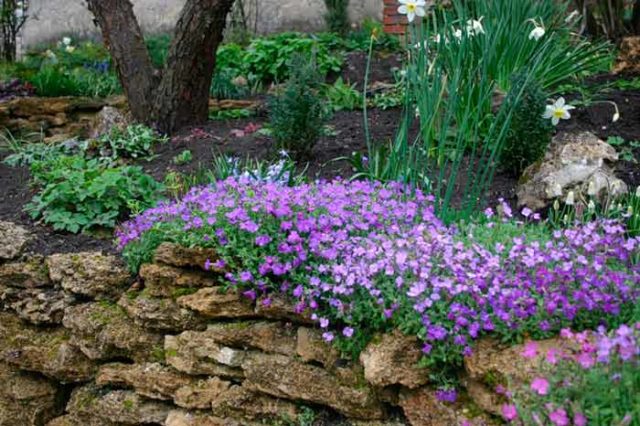
Alpine landscape is in perfect harmony with daffodils
Conclusion
Periwinkle in landscape design can be used for a variety of purposes. It is unpretentious and undemanding, while its decorative effect remains even after the end of flowering. Its additional plus is that the plant has good frost resistance, in many regions it can be grown without shelter for the winter.
